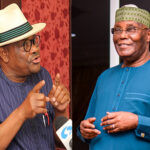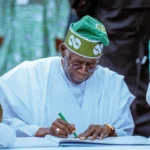The United States Ambassador to Nigeria, Richard Mills, has dismissed claims that the United States Agency for International Development (USAID) is funding Boko Haram or any other terrorist group.

Speaking after a meeting with the Nigeria Governors Forum in Abuja on Wednesday night, Mills reaffirmed that the U.S. strongly condemns Boko Haram’s violent activities.
He assured that if any credible evidence of funding misuse arises, the U.S. government will work with Nigerian authorities to investigate.
His statement follows allegations made on February 13 by U.S. Congressman Scott Perry, who accused USAID of financing terrorist groups, including Boko Haram.
Perry made these claims during a congressional hearing on government spending, suggesting that U.S. taxpayer money—approximately $697 million annually—was being diverted to fund terrorism.
The session, titled “The War on Waste: Stamping Out the Scourge of Improper Payments and Fraud,” focused on alleged misappropriations of taxpayer funds.
“Who gets some of that money? Does that name ring a bell to anybody in the room? Because your money, your money, $697 million annually, plus the shipments of cash funds in Madrasas, ISIS, Al-Qaeda, Boko Haram, ISIS Khorasan, terrorist training camps. That’s what it’s funding,” he said.
In response to these allegations, the Nigerian Senate has called on National Security Adviser Nuhu Ribadu, along with intelligence and defense agency leaders, to address concerns about possible links between USAID funding and terrorist groups.
Ambassador Richard Mills, however, insisted that the U.S. has strict regulations in place to prevent any aid from being misused.
He emphasized that the U.S. government has rigorous measures to ensure that no USAID funding or any other form of assistance is diverted to terrorist organizations.
Mills reassured that if any evidence of misuse were found, immediate investigations would be launched with Nigerian authorities.
He stated, “Let me be clear—there is no friend of Nigeria stronger in condemning Boko Haram’s violence and disregard for human life than the United States. We have designated Boko Haram as a foreign terrorist organisation since 2013, blocking the group from transferring assets to the US and allowing us to arrest and seize its members.
“We cooperate in investigations with the Nigerian government. I can assure you that we have strict policies and procedures to ensure that USAID funding or any other US assistance, whether from USAID, the Department of Defence, or the State Department, is not diverted to terrorist groups like Boko Haram.
“There is absolutely no evidence of such diversion, and if we ever had evidence that any programme funding was being misused by Boko Haram, we would immediately investigate it with our Nigerian partners.
“So, when it comes to Boko Haram, the United States stands with Nigeria in wanting to rid this country of the scourge that this organisation represents.”
On broader U.S.-Nigeria relations, Mills discussed future priorities with state governors, highlighting trade and investment, transparency and accountability, state-level engagement, and healthcare partnerships.
He noted that while some U.S. assistance programs are being reviewed for better efficiency, critical aid—such as healthcare support for HIV patients and maternal care—remains unaffected.
He clarified that President Donald Trump’s administration did not cut assistance but implemented a 90-day pause to develop ways to make it more effective.
Mills explained, “No assistance has been cut yet, and no decisions have been made about the future of our assistance. In fact, US Secretary of State, Marco Rubio, has said that this is not about ending foreign assistance to our partners like Nigeria. It’s about making our assistance more effective and aligning it with US government policies and interests.
“That’s what this 90-day pause is for. However, there are waivers for life-saving assistance, such as support for HIV patients, maternal and child nutrition, and internally displaced people. So that continues. In 90 days, we will know where we stand.”
Mills further emphasized the importance of sustaining healthcare initiatives and transitioning them to the Nigerian government to ensure long-term impact.
Regarding other issues discussed with the 36 state governors, the US Ambassador mentioned that he outlined the embassy’s vision for the future of the US-Nigerian relationship.
He stated, “I explained to them that we are going to focus on four key priorities in the coming years. The first is improving the business environment to increase trade and investment between the United States and Nigeria.
“Second, a renewed focus on improving transparency and accountability in Nigeria, fighting corruption, and empowering Nigerian voices advocating for more transparency.
“Third, we want to be more engaged at the subnational level, at the state level, and with local governing authorities. I believe the embassy needs to engage more in this area as we develop our programs and assistance.
“Lastly, we discussed our health care programmes, which are a large part of US assistance to Nigeria. As these programmes succeed—such as reducing HIV cases and eradicating polio—we want to ensure their sustainability and transition them to the Nigerian government at the federal and state levels.”
Richard Mills stated that the aim is to ensure the sustainability of these health programmes and transfer them to the Nigerian government for effective management, helping to create a stronger healthcare future.
KanyiDaily recalls that United States government recently suspended funding for HIV treatment programs in Nigeria and other developing countries following an order by President Donald Trump.




![Kunle Remi Announces Birth Of First Child With His Wife Tiwi [Video] 5 Kunle Remi Announces Birth Of First Child With His Wife Tiwi [Videp]](https://media.kanyidaily.com/2025/03/26182852/Kunle-Remi-wife-150x150.webp)





!["You're A Greedy, Heartless, Wicked President" - Nigerian Lady Slams Tinubu [Video] 17 "You're A Greedy, Heartless, Wicked President" - Nigerian Lady Slams Tinubu [Video]](https://media.kanyidaily.com/2025/03/26110211/Tinubu-150x150.jpg)
![Oby Ezekwesili Shares Her Account Of What Led To Her Clash With Senator Nwaebonyi 19 Ezekwesili Shares Her Account Of What Led To Her Clash With Nwaebonyi [Video]](https://media.kanyidaily.com/2025/03/26101440/Ezekwesili-Nwaebonyi-150x150.png)



